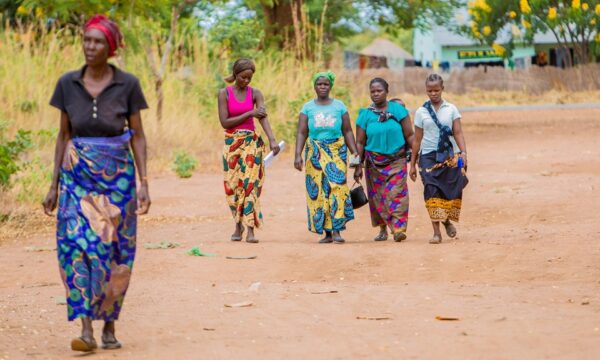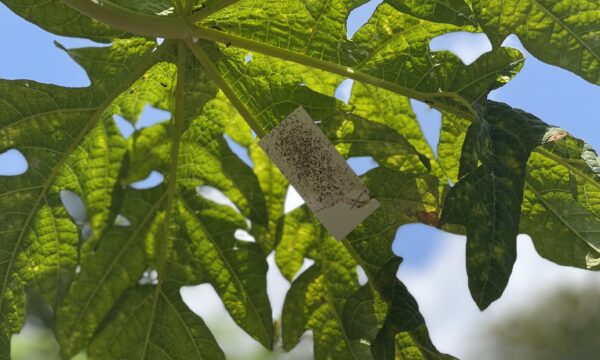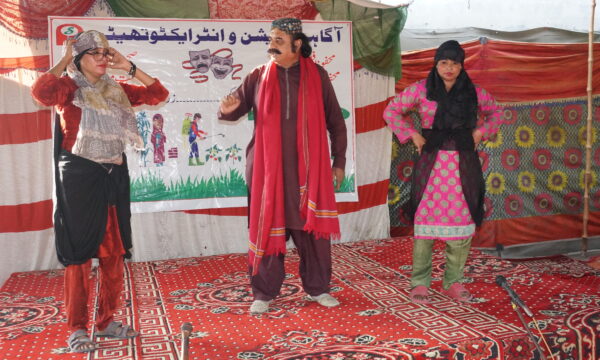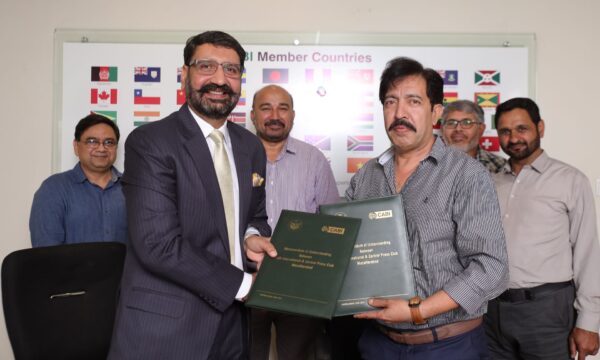
Tomato is an important crop in Pakistan – every year, the country produces 4.2 million tonnes of tomatoes. Growing them can be labour intensive. But research shows that tomato production has the potential to generate good incomes for rural smallholders. This includes incomes for women farmers. In Pakistan, women account for over 60% of active agricultural labour force. They mainly support crop cultivation, which involves activities such as seed preparation, sowing and weeding.
However, women farmers in Pakistan often struggle to make incomes from farming. They find it difficult to access agricultural advice, for example. Social norms restrict their physical mobility, making it more difficult for them to travel and find agricultural advice and support.
And when it comes to using eco-friendly pest control in tomato farming, women face more challenges than men. A CABI-led study investigated the barriers that women in Pakistan face when using biocontrol. This gender analysis considered the uptake of Trichogramma chilonis. This tiny wasp is used to control cotton bollworm (Helicoverpa armigera) on tomato crops in Pakistan. Our blog explores the research.
Pests and tomato production

Tomato productivity is still low in Pakistan compared to other countries. And often this is due to pests and diseases. The cotton bollworm causes significant tomato crop losses, for example. Studies revealed that the bollworm infested crops up to 35% with 53% fruit losses in the Peshawar district of Khyber Pakhtunkhwa.
To address pests, farmers regularly use insecticides. But these chemical products can be dangerous. They harm animal health, human health, and the environment. Biological control (biocontrol) is an eco-friendly alternative. Trichogramma chilonis is a natural enemy of the cotton bollworm. It controls the pest’s numbers and spread. And it does this without harming ecosystems.
Studying the gender imbalance in tomato pest control
But male and female farmers have not been able to take advantage of this biocontrol in equal measure. A CABI-led study investigated barriers to men and women’s uptake of Trichogramma in the Khyber Pakhtunkhwa, Punjab, and Sindh provinces of Pakistan. These are some of the biggest tomato-producing states in Pakistan. CABI Gender Coordinator, Bethel Terefe, led the research, which was published in the journal Sustainability.
To understand women’s use of Trichogramma, researchers interviewed tomato farmers. This included in-depth interviews and focus groups with female and male farmers using Trichogramma. The researchers also talked to agricultural extension staff, who share information about biocontrol technology with smallholders.
Women might not benefit from biocontrol in the same way as men…
Results revealed that targeting women with communication about Trichogramma helped to improve uptake by farming households. This might not be surprising, given the boost that knowledge sharing can give to women farmers and labourers. However, researchers also discovered that using Trichogramma increased the demand on women’s labour and time. And despite being involved in the biocontrol practices, it didn’t increase their influence into how the income from tomatoes was spent.
Why is this? Female participants in the study discussed several reasons. Their increased involvement led to higher work burdens. This meant they had less time for household chores, which still had to be done. The women work for 12 to 15 hours per day, and half of that time is spent on unpaid care and domestic work.
Furthermore, women were unable to reap the monetary benefits of increased tomato production. This is because the men sold the produce and then controlled the income. Only eight out of 21 women in Punjab had a say on income allocation from the sale of the tomatoes. And women were only able to manage 10% of the income from the sale of the produce.
…but women are more appreciative of the health benefits that biocontrol brings
But despite these disadvantages, women were still in favour of biocontrol, more so than male respondents. This is due to the reduced risk to health that biocontrol brings. Compared to chemical pesticide use, biocontrol is a much safer option for human health, and women farmers recognized and appreciated that.
Men are mostly responsible for pesticide application. They wear personal protective equipment (PPE) when doing so. However, even though women are not usually involved in this process, they come into contact with pesticides during harvesting. They, and even their children are then exposed to the chemicals. Women typically don’t wear PPE to gather a harvest. During the study, women complained of skin allergies and respiratory problems from working in fields sprayed with pesticides.
In this context, it’s easy to understand why women might be more appreciative of non-chemical pest control methods. Biocontrol reduces their exposure to dangerous chemicals.
Improving the uptake of tomato biocontrol among women
With these results in mind, the research concluded with a series of recommendations. They included targeting women directly with communications campaigns to improve the uptake of households’ technologies. This is because women can influence uptake decisions, even if they don’t usually make decisions about agricultural technologies themselves.
Furthermore, compared to men, women are supportive of biocontrol. They appreciate its health benefits. So, not targeting women about its benefits is a missed opportunity. When it comes to promoting environmentally friendly agricultural practices, women must be included.

And finally, when we introduce new practices or technologies that demand women’s labour, we must ensure that women can benefit from the income gains generated. By addressing social norms, women have more agency to make their own decisions. This helps them overcome barriers that stop them from pursuing better-paid employment in agriculture. Addressing social norms helps women to have say about how family income is spent. Furthermore, the money they earn from farm labouring is income they can control themselves. It’s often the only type of income they can fully control.
The study was part-funded through PlantwisePlus. A key part of the programme is enhancing women’s knowledge and uptake of climate smart plant health practices. This involves equipping agricultural advisory services with decision making tools to advise women farmers. Extension agents are increasingly making use of new plant health solutions. We must ensure both men and women farmers are able to access their advisory services and benefit from it.
Read the full paper here: Gender Analysis of Uptake of Trichogramma chilonis to Control Helicoverpa armigera on Tomato Crops in Pakistan
For more information about PlantwisePlus click here.
Find out more
CABI Compendium datasheet: Helicoverpa armigera (cotton bollworm)
Women farmers in Pakistan aren’t realising their potential – here’s why
Reaping the rich harvest of the kitchen garden despite devastating floods in Pakistan
Related News & Blogs
Empowering women farmers in Pakistan with pest control knowledge
Women farmers in Pakistan play a central role in the country’s economy. However, many struggle to access essential information about sustainable farming approaches. Women make up nearly 66% of the agricultural workforce in Pakistan. Yet they receive ve…
30 May 2025




